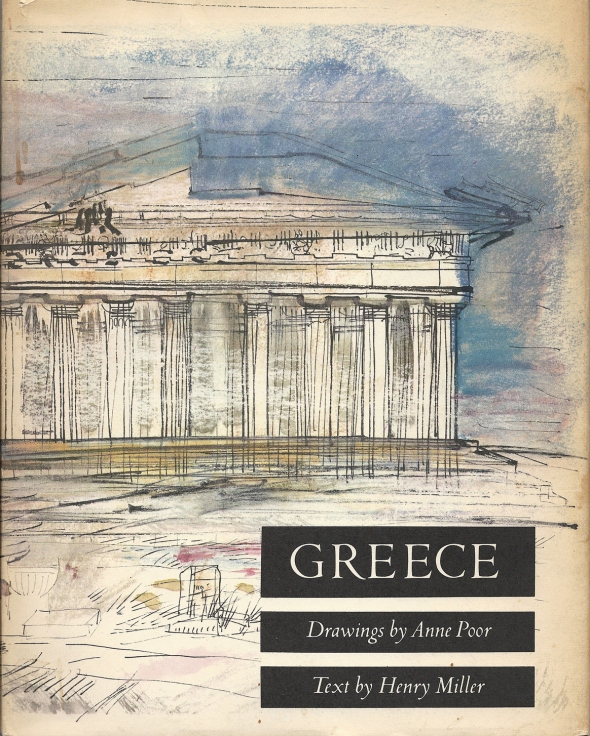Orientations in Sunlight: With Durrell in Rhodes
Posted: November 1, 2019 Filed under: Archival Research, Biography, Book Reviews, History, Mediterranean Studies, Modern Greek History | Tags: Florestano di Fausto, Italian Colonies, Lawrence Durrell, Marine Venus, Mario Lago, Rhodes 9 Comments“In Rhodes the days drop as softly as fruit from trees. Some belong to the dazzling ages of Cleobolus and the tyrants, some to the gloomy Tiberius, some to the crusaders. They follow each other in scales and modes too quickly almost to be captured in the nets of form,” wrote Lawrence Durrell (1912-1990) in the first pages of his acclaimed memoir Reflections on a Marine Venus: A Companion to the Landscape of Rhodes (1953). More than seventy years later, if Durrell were still alive, he would have added “… some to the crusaders, some to the Italians.”

Durrell was stationed in Rhodes for two years when the Dodecanese was under British Administration (1945-1947). As Information Officer, he supervised the publication of three daily papers, in Greek, Turkish, and Italian. (I found copies of the Greek one, ΧΡΟΝΟΣ, in the Nicholas Mavris Papers in the ASCSA Archives. Mavris, a prominent member of the Greek American community, in 1948 became the first governor commissioner of the freed Dodecanese.)

ΧΡΟΝΟΣ, Aug. 8, 1945. ASCSA Archives, Nicholas Mavris Papers.
WW II had just ended and the fate of the Dodecanese was still uncertain. Despite their Greek past, these islands in the southeastern part of the Aegean (also known as Southern Sporades) did not join Greece until 1947, having passed from the Ottomans directly to the Italians in 1913, from the Italians to the Germans in 1943, and from them to the British. In 1946, the Allied Forces in Paris finally agreed upon the integration of the Dodecanese with Greece. It was not until the 31st of March 1947, however, that the British officially delivered the administration of the Dodecanese to the Greek State.
Durrell did not write Marine Venus while on Rhodes but a few years later, relying on his memory and “sifting into the material, now some old notes from a forgotten scrapbook, now a letter” (Marine Venus, p. 3).[1]
“Of Paradise Terrestre” Read the rest of this entry »
Henry Miller’s Timeless Greece through the Drawings of Anne Poor
Posted: June 1, 2015 Filed under: American Studies, Archival Research, Mediterranean Studies, Modern Greek History, Modern Greek Literature, Philhellenism | Tags: Anne Poor, George Katsimbalis, George Seferis, Henry Miller, Lawrence Durrell, Michel Déon, The Colossus of Maroussi 4 CommentsThe Modern Greek Exam, “Professor Blank’s” Method, and Other Stories from the 1930s
Posted: October 1, 2013 Filed under: Archaeology, Classics, Education, Women's Studies | Tags: American School of Classical Studies at Athens, David M. Robinson, Edward Capps, LaRue Van Hook, Lawrence Durrell, Marian Welker, Richard Stillwell, Samuel E. Bassett 9 CommentsAfter publishing Jack Davis’ essay about the recent history of the ASCSA admission exams and while I was reflecting on Donald Haggis’ reference to the Modern Greek exam, defunct since WW II, I recalled a passage in Lawrence Durrell’s Prospero’s Cell (1947). While writing about his life in pre-WWII Corfu, Durrell painted a perceptive, if not-so-flattering, image of the foreign archaeologist in Greece: “Like earnest mastodons petrified in the forests of their own apparatus, the archaeologists come and go, each with his pocket Odyssey and his lack of Modern Greek. Diligently working on the refuse heaps of some township they erect on the basis of a few sherds or a piece of dramatic drainage, a sickly and enfeebled portrait of a way of life.”
Durrell’s criticism and the recent discussion of exams in this blog enticed me look more carefully than I had ever previously done at the pre-WWII fellowship exams. Here, I should emphasize that these were FELLOWSHIP exams. Before WW II there were no admission exams. Candidates sat competitive examinations only for fellowships. Harold Fowler (1904-1917), Samuel Bassett (1917-1936), Benjamin Meritt (1931-1932), and others served as Chairmen of the Committee on Fellowships (only in 1950 was its name changed to the Committee on Admissions and Fellowships). Students were admitted on the basis of their credentials; although a knowledge of Classical Greek “was expected and assumed…in exceptional cases, a student ignorant of the Greek language [was] accepted as regular member of the School if he [was] qualified to pursue special studies in some field (e.g., architecture or art) where a knowledge of the Greek language [was] not absolutely necessary (ASCSA Handbook of Information, 1932, p. 16). Those competing for fellowships in Archaeology were examined in Modern Greek, but not in Ancient.
What were these exams like? Below I reproduce, as an example, the Modern Greek exam of 1936, which to my surprise also included a passage to be translated from English to Greek, as well as the requirement to translate an essay by poet Kostis Palamas from Greek to English. The passage for translation from English is amusing and imagines a conversation between an American archaeologist and a Greek boatman, the latter complaining about Edmond About’s unflattering portrayal of Greece (La Grèce contemporaine, 1858) and hoping that his American passenger will steer a different course! Read the rest of this entry »


